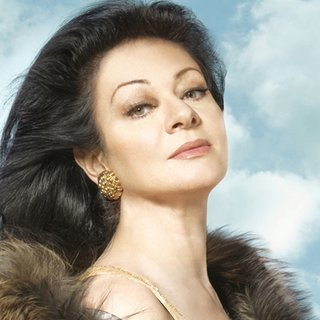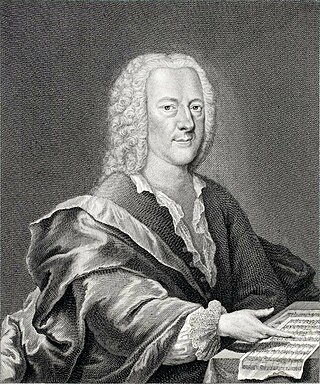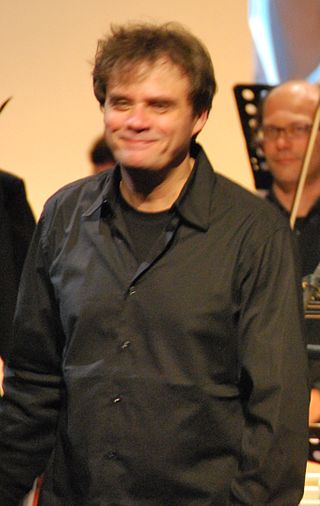
Giovanni Battista Draghi, usually referred to as Giovanni Battista Pergolesi, was an Italian Baroque composer, violinist, and organist, leading exponent of the Baroque; he is considered one of the greatest Italian musicians of the first half of the 18th century and one of the most important representatives of the Neapolitan school.
This is a list of notable events in music that took place in the year 1733.
The Querelle des Bouffons, also known as the Guerre des Bouffons, was the name given to a battle of musical philosophies that took place in Paris between 1752 and 1754. The controversy concerned the relative merits of French and Italian opera. It was also known as the Guerre des Coins, with those favoring French opera in the King's corner, and those favoring Italian opera in the Queen's corner.

La serva padrona, or The Maid Turned Mistress, is a 1733 intermezzo by Giovanni Battista Pergolesi (1710–1736) to a libretto by Gennaro Federico, after the play by Jacopo Angello Nelli. It is some 40 minutes long, in two parts without overture, and was written as light-hearted staged entertainment between the acts of Pergolesi's serious opera Il prigionier superbo. More specifically each of the two parts, set in the same dressing room, played during an intermission of the three-act opera to amuse people who remained in their seats.

Daniela Dessì was an Italian operatic soprano.
Nuccia Focile is an Italian operatic soprano.
The Boston Early Music Festival (BEMF) is a non-profit organization founded in 1980 in Boston, Massachusetts, to promote historical music performance. It arranges an annual Boston and New York City concert series, produces opera recordings, and organizes a biennial week-long Festival and Exhibition in Boston.

Pimpinone, TWV 21:15, is a comic opera by the German composer Georg Philipp Telemann with a libretto by Johann Philipp Praetorius. Its full title is Die Ungleiche Heirat zwischen Vespetta und Pimpinone oder Das herrsch-süchtige Camer Mägden. The work is described as a Lustiges Zwischenspiel in three parts. It was first performed at the Oper am Gänsemarkt in Hamburg on 27 September 1725 as light relief between the acts of Telemann's adaptation of Handel's opera seria Tamerlano. Pimpinone was highly successful and pointed the way forward to later intermezzi, particularly Giovanni Battista Pergolesi's La serva padrona.

Ottavio Dantone is an Italian conductor and keyboardist particularly noted for his performances of Baroque music. He has been the music director of the Accademia Bizantina in Ravenna since 1996.
Gaetano Monti was an Italian composer. His name is first recorded in 1758, when he was eight years old, singing in a small part in a performance of Il curioso del suo proprio danno by Niccolò Piccinni. His first opera, Adriano in Siria, was performed in Modena in 1775, and he was later named organist of the Treasury Chapel at Naples Cathedral; there he remained until 1788. Moreover, in 1776 he became an impresario at the Teatro San Carlo. Most of his works were opere buffe, and were seen in theatres in Rome, Venice, and Naples. His most popular works were Le donne vendicate and Lo studente. It was believed at one time that he was the brother of the poet Vincenzo Monti, but this is uncertain.
Pietro Chiarini was an Italian composer.

Il prigionier superbo is an opera seria in three acts, composed by Giovanni Battista Pergolesi to a libretto attributed to Gennaro Antonio Federico, and based on an earlier libretto by Francesco Silvani for Gasparini's opera, La fede tradita e vendicata. It was premiered at the Teatro San Bartolomeo in Naples on 5 September 1733 and received further performances in October. The opera, with its labyrinthine plot involving the rivalry of Metalce and Viridate for the hand of Rosmene, soon sank into oblivion, but its comic intermezzo, La serva padrona was to achieve considerable success when performed on its own.

Adriano in Siria is a libretto by Italian poet Metastasio first performed, with music by Antonio Caldara, in Vienna in 1732, and turned into an opera by at least 60 other composers during the next century. Metastasio based the background of the story on late Classical works by Cassius Dio and Elio Sparziano.
Alessandra Marianelli is an Italian soprano. She made her professional debut in 2002 as Barbarina in Le nozze di Figaro and went on to sing leading roles in the opera houses of her native country and internationally. Her recordings include Amour in Orphée et Eurydice for Decca Records and Fiorilla in Il turco in Italia for Naxos Records. She also appeared in Carlos Saura's 2009 film Io, Don Giovanni.

George Andguladze is a Georgian operatic bass.

L'Olimpiade is an opera in the form of a dramma per musica in three acts by the Italian composer Giovanni Battista Pergolesi. Pergolesi took the text, with a few modifications, from the libretto of the same name by Pietro Metastasio. The opera first appeared during the Carnival season of 1735 at the Teatro Tordinona in Rome and "came to be probably the most admired" of the more than 50 musical settings of Metastasio’s drama.

Adriano in Siria is an opera by Giovanni Battista Pergolesi setting Metastasio's libretto of the same name. It was the third of his four opere serie, premiered at Teatro San Bartolomeo in Naples on 25 October 1734. It has a historical subject. Adriano is the Italian name for the Roman emperor Hadrian. Pergolesi also provided a comic intermezzo La contadina astuta, later better known as Livietta e Tracollo, to a libretto by Tommaso Mariani.
Gennaro Antonio Federico was a Neapolitan poet and opera librettist. He is best remembered for his collaborations with G. B. Pergolesi including La serva padrona.

Dominika Zamara is a Polish operatic soprano. She was artisticly trained in Italy.
Tommaso Mariani was an Italian librettist active in Naples who penned the texts to one opera seria and many comic operas and intermezzi. His nickname, "romano", suggests that he may have been born in Rome. This is further bolstered by the topics and settings of the majority of his operas, which unlike his contemporary Neapolitan writers, moved away from stories about Naples and its citizens. More than half of his comedies are set in other Italian cities such as Rome, Pistoia, Pisa, and Antignano. However, according to Pietro Napoli Signorelli, Mariani was educated in Naples.











